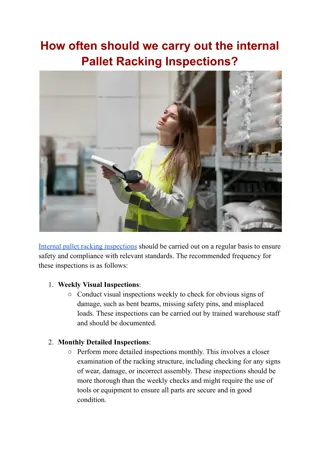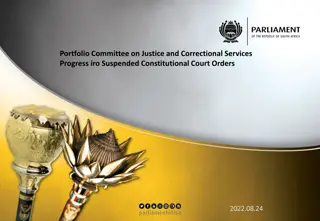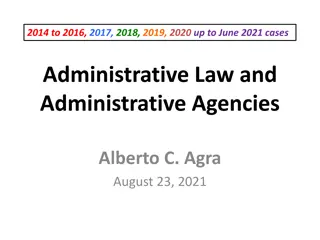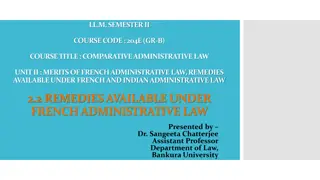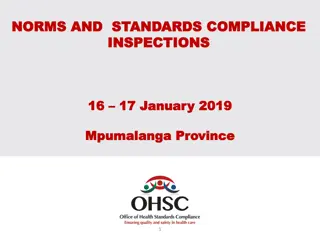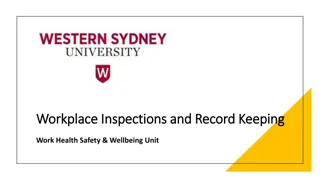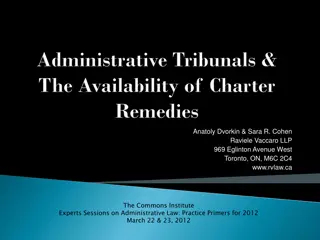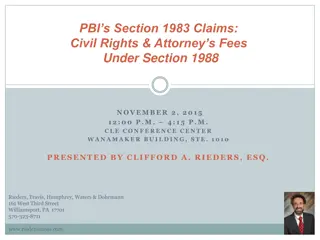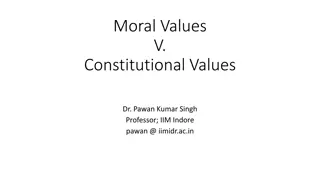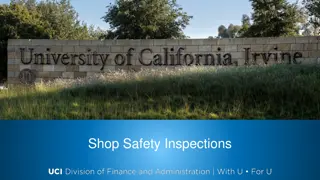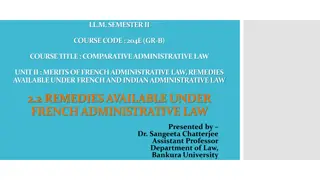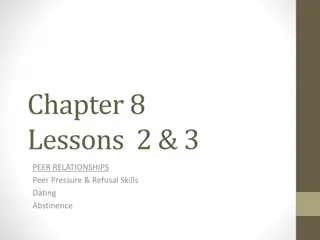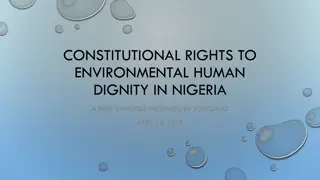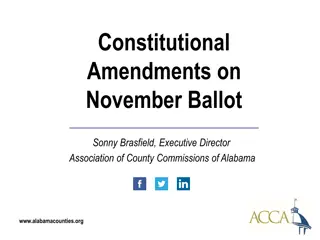Constitutional Rights in Administrative Inspections: Refusal to Comply
This content discusses the Fourth and Fifth Amendments in the context of administrative inspections, emphasizing the protection of individuals against unreasonable searches and seizures. It covers the incorporation by the Fourteenth Amendment and key legal cases related to privacy rights and due process.
Download Presentation

Please find below an Image/Link to download the presentation.
The content on the website is provided AS IS for your information and personal use only. It may not be sold, licensed, or shared on other websites without obtaining consent from the author.If you encounter any issues during the download, it is possible that the publisher has removed the file from their server.
You are allowed to download the files provided on this website for personal or commercial use, subject to the condition that they are used lawfully. All files are the property of their respective owners.
The content on the website is provided AS IS for your information and personal use only. It may not be sold, licensed, or shared on other websites without obtaining consent from the author.
E N D
Presentation Transcript
Refusal to Comply: Administrative Inspections and the Fourth and Fifth Amendments Sarah A. Bradley Public Lawyers Conference May 16-18, 2018
The Fourth Amendment Fourth Amendment: The right of the people to be secure in their persons, houses, papers, and effects, against unreasonable searches and seizures, shall not be violated, and no Warrants shall issue, but upon probable cause, supported by Oath or affirmation, and particularly describing the place to be searched, and the persons or things to be seized.
The Fifth Amendment Fifth Amendment: No person shall be held to answer for a capital, or otherwise infamous crime, unless on a presentment or indictment of a Grand Jury, except in cases arising in the land or naval forces, or in the Militia, when in actual service in time of War or public danger; nor shall any person be subject for the same offence to be twice put in jeopardy of life or limb; nor shall be compelled in any criminal case to be a witness against himself, nor be deprived of life, liberty, or property, without due process of law; nor shall private property be taken for public use, without just compensation.
Incorporation by The Fourteenth Amendment s Due Process Clause Mapp v. Ohio, 367 U.S. 643 (1961). The Fourth Amendment s right of privacy is enforceable against the States through the Due Process Clause of the Fourteenth Amendment. All citizens are protected against unreasonable searches and seizures so that the Fourth Amendment does not become only a form of words. Fifth Amendment is partially incorporated to the States. Right against self-incrimination incorporated in Malloy v. Hogan, 278 U.S. 1 (1964). Right to indictment by a grand jury (not incorporated) Hurtado v. California, 110 U.S. 516 (1884); Double jeopardy (incorporated) Benton v. Maryland, 395 U.S. 784 (1969); Protection against taking property without due compensation (incorporated) Chicago, Burlington & Quincy Railroad Co. v. City of Chicago, 166 U.S. 226 (1897).
Nelson v. State, 96 Nev. 363 (1980). [W]e emphasize the cardinal principal of search and seizure law: searches conducted outside the judicial process, without prior approval by a magistrate of judge, are per se unreasonable under both the Nevada and United States constitutions subject only to specifically established and well-delineated exceptions. at 365 (quoting State v. Hardin, 90 Nev. 10 (1974). A citizen s assertion of her constitutional rights may not be deemed tantamount to a reasonable belief that she had committed a felony. See also Katz v. United States, 389 U.S. 347 (1967); Phillips v. State, 106 Nev. 763 (1990).
Another Consideration 42 U.S.C. 1983 Every person who, under color of any statute, ordinance, regulation, custom, or usage, of any State or Territory or the District of Columbia, subjects, or causes to be subjected, any citizen of the United States or other person within the jurisdiction thereof to the deprivation of any rights, privileges, or immunities secured by the Constitution and laws, shall be liable to the party injured in an action at law, suit in equity, . . .
What does this mean for State Agencies and Local Governments? Generally, getting an administrative warrant avoids any potential problem. But this is not always practical. So now what?
Camara v. Municipal Ct., 387 U.S. 523 (1967) Facts: November 6, 1963: Routine annual inspection of apartment building by an inspector of the Division of Housing Inspection of the San Francisco Department of Public Health. Inspector did not have a warrant. Camara was using the ground floor as a personal residence. Inspector said occupancy permit did not allow that and demanded he be allowed to inspect the premises. Camara refused. Inspector returned again on November 8, 1963 without a warrant. Citation mailed ordering Camara to appear at the DA s Office. Camara failed to appear and two inspectors returned to his apartment on November 22, 1963. Told Camara Section 503 of the Housing Code requires him to permit the inspection. Camara again refused the inspection and criminal complaint was field against him.
Camara Holding and Analysis (1) [E]xcept in certain carefully defined classes of cases, a search of private property without proper consent is unreasonable unless it has been authorized by a valid search warrant. Overruled Frank v. State of Maryland, 359 U.S. 360 (1959) (court says facts are different in Frank, but given that Frank is being used to sanction warrantless inspections, it is overruled.) Routine inspection of the physical condition of private property is a less hostile intrusion than the typical policeman s search for the fruits and instrumentalities of crime. [W]e cannot agree that the Fourth Amendment interests at stake in these inspection cases are merely peripheral.
Camara Holding and Analysis (2) Like most regulatory laws, fire, health, and housing codes are enforced by criminal processes. In some cities, discovery of a violation by the inspector leads to a criminal complaint. Even in cities where discovery of a violation produces only an administrative compliance order, refusal to comply is a criminal offense, and the fact of compliance is verified by a second inspection, again without a warrant. Finally as this case demonstrates, refusal to permit an inspection is itself a crime, punishable by fine or even by jail sentence. The question is not . . . whether these inspections may be made, but whether they may be made without a warrant. Instead, the question is does the burden of obtaining a warrant frustrate the government s purpose behind the search? In this case, the Court says no.
Camara Holding and Analysis (3) Administrative searches of the kind at issue here are significant intrusions upon the interests protected by the Fourth Amendment, that such searches when authorized and conducted without a warrant procedure lack the traditional safeguards which the Fourth Amendment guarantees to the individual. Inspector does not need probable cause that there is a violation of minimum standards prescribed by the code being enforced. Instead, need to show need for periodic inspection of the location. Example: Faulty wiring may not be visible on the outside of the building.
Camara Holding and Analysis (4) Time period between inspections may provide appropriate support for probable cause to make inspection. Also: Nature of building (multi-family apartment house) or condition of the entire area may support probable cause. Emergency situations still okay without a warrant. [A]s a practical matter and in light of the Fourth Amendment s requirement that a warrant specify the property to be searched, it seems likely that warrants should normally be sought only after entry is refused unless there has been a citizen complaint or there is other satisfactory reason for securing immediate entry. [T]he requirement of a warrant procedure does not suggest any change in what seems to be the prevailing local policy, in most situations, of authorizing entry, but not entry by force, to inspect.
Camara: Its Still About Reasonableness Reasonableness is still the ultimate standard. The warrant procedure is designed to guarantee that a decision to search private property is justified by a reasonable government interest. If a valid public interest justifies the intrusion contemplated, then there is probable cause to issue a suitably restricted search warrant. [G]ives full recognition to the competing public and private interests here at stake and, in so doing, best fulfills the historic purpose behind the constitutional right to be free from unreasonable government invasions or privacy. See Eaton v. Price, 364 U.S. 263, 273-74 (1960).
CamaraFactors Persuasive factors that support reasonableness of area code-enforcement inspections: Long history of judicial and public acceptance. Public interest demands that all dangerous conditions be prevented or abated. Not personal in nature nor aimed at discovery of evidence of a crime, inspections involve a relatively limited invasion of citizen s privacy. Probable cause to issue a warrant to inspect must exist if reasonable legislative or administrative standards for conducting an area inspection are satisfied with respect to a particular dwelling.
Rule in Camara Camara had a constitutional right to insist that the inspectors obtain a warrant to search and he may not be constitutionally convicted for refusing to consent to the inspection.
Similar Case in Nevada Owens v. City of North Las Vegas, 85 Nev. 105 (1969). Facts: Owens refused to allow city building inspector to enter his home to check for violations of the city building code. In October 1966, the City sent a registered letter to Owens indicating that an inspector from the City would come to inspect for structural deficiencies in violation of the city building code. Inspector arrived on October 25, 1966 and Owens wife refused permission to inspect the home. Inspection attempted again on June 20, 1967, and not permitted by homeowner. On June 30, 1967, inspector noted violations of the building code on the exterior of the home and report them to the city attorney. City attorney told inspector to get a search warrant and Justice of the Peace gave inspector the search warrant.
Owens Facts Continued Owens called chief of police and told him that he would not honor the warrant. Search warrant was served and executed. Inspection done and 27 violations of city building code found. Owen charged with assault and battery and obstructing a police officer in an attempt to serve the search warrant. Owens found guilty of assault and battery on a peace officer by a jury and fined $100. Owens filed a petition for a writ of habeas corpus, challenging the legality of his conviction.
OwensHolding and Analysis (1) It is now the law of the land that administrative searches and inspections, such as in this case, are significant intrusions upon the interests protected by the Fourth Amendment and that such inspections and searches, when authorized and conducted without a warrant procedure, lack the traditional safeguards which the Fourth Amendment guarantees to every individual. Probable cause standard in criminal investigations differs than the standard required in administrative inspection programs. (See Camara). [P]rimary governmental interest at stake is to prevent even the unintentional development of conditions which are hazardous to public health and safety. Because fires and epidemics may ravage large urban areas, because unsightly conditions adversely affect the economic values of neighboring structures, numerous courts have upheld the police power of municipalities to impose and enforce such minimum standards even upon existing structures. (quoting Camara).
Owens Holding and Analysis (2) Where considerations of health and safety are involved, the facts that would justify an inference of probable cause to make an inspection are different from those that would justify an inference when a criminal investigation has been undertaken. Controlling standard is reasonableness. In emergency situations, the law has always permitted prompt inspections, even without a warrant. Search of Owens home was reasonable and his jury conviction lawful.
Michigan v. Clifford, 464 U.S. 287 (1984) Facts: Clifford family s private residence was damaged by an early morning fire while they were out of town. Fire extinguished at 7:04 a.m. and all fire officials and police left. Five hours later, a team of arson investigators arrived at the residence to investigate the cause of the fire. Found work crew securing the house sent by insurance agent. Investigators entered the residence and conducted an extensive search without obtaining consent or an administrative warrant. Found two Coleman fuel cans and a crock pot attached to an electrical timer in the basement. Investigators determined fire had been set deliberately. Marked and seized these items as evidence. Found additional evidence of arson in the upper portions of the house. Cliffords charged with arson and moved to suppress all evidence seized in the warrantless search.
Michigan Holdings There is a reasonable expectation of privacy in fire- damaged residence because personal belongings remained in the home and the owners attempted to secure house against intrusion via work crew. Because investigators left and came back to the home, search directed to cause and origin of a fire is subject to the warrant requirement. Administrative warrant is required if primary object is to determine cause and origin of fire. Criminal warrant is required when primary object of search is to gather evidence of criminal activity. Once fire investigators had determined cause of fire, additional search of home was only for the purpose of finding evidence of arson and a criminal warrant was required.
MichiganSummary A burning building creates an exigency that justifies a warrantless entry by fire officials to fight the blaze. Once in the building, officials need no warrant to remain for a reasonable time to investigate the cause of the blaze after it has been extinguished. (quoting Michigan v. Tyler, 436 U.S. 499, 510 (1978)). Reasoning: The aftermath of a fire often presents exigencies that will not tolerate the delay necessary to obtain a warrant or to secure the owner s consent to inspect fire-damaged premises and determining the cause and origin of a fire serves a compelling public interest. Where reasonable expectations of privacy remain in the fire- damaged property (shown by efforts to secure the home), additional investigations begun after the fire is extinguished and fire and police officials have left the scene, generally a warrant would be required or the identification of a new exigency. In this case, basement search required administrative warrant, and search of upper portions of house required criminal warrant. Type of warrant required depends on purpose of search. In other words, what is the primary objective of the search?
Palmieri v. Clark County, 367 P.3d 442 (2015) Facts: County animal control officer obtained search for Palmieri s home based on information provided by an informant to who gave a false identity. Criminal charges were brought against Palmieri after the search for violations of county code for provisions for health and welfare of animals. Palmieri filed 1983 action, alleging violations of her Fourth and Fourteenth Amendment rights.
Palmieri Holding and Analysis Probable cause is the standard by which a search s reasonableness is tested, and the type of probable cause necessary to support a search warrant differs depending on the objective of the search. [C]riminal search warrants require a stronger showing of probable cause, whereas administrative search warrants generally are supportable by a lesser showing of probable cause. See Marshall v. Barlow s, Inc., 436 U.S. 307, 320 (1978). This case turns on whether the search warrant is an administrative or a criminal search warrant.
Palmieri: Defines Administrative Search Warrant Generally an administrative warrant is a warrant issued by a judge authorizing an administrative agency to conduct a search to determine whether physical conditions exists which do not comply with minimum standards prescribed in local regulatory ordinances. Quoting Camara, 387 U.S. at 530. Black s Law Dictionary (10th ed. 2014): A warrant issued by a judge at the request of an administrative agency that seeks to conduct an administrative search. Blacks Law Dictionary (10th ed. 2014): The inspection of a facility by one or more officials of an agency with jurisdiction over the facility s fire, health, or safety standards. [A]n administrative search warrant merely authorizes a routine inspection for regulatory compliance. [L]ess hostile intrusion than a criminal search.
Palmieri Result Decision to issue a search warrant is not reviewed de novo; instead the Court looks at whether the evidence, taken together, demonstrated a substantial basis for the issuing court s probable cause determination. Constitutionality of search is reviewed de novo. Palmieri failed to make a substantial showing that inspector knowingly and intentionally, or with reckless disregard for the truth, included a false statement in the administrative search warrant affidavit, and Palmieri failed to establish a genuine issue of material fact with regard to whether the administrative search warrant was supported by probable cause to search Palmieri s residence. Inspector is entitled to qualified immunity because Palmieri failed to established that he violated her constitutional rights.
Business Inspections: Burger New York v. Burger, 482 U.S. 691 (1987). 6 to 3 decision. The owner or operator of commercial premises in a closely regulated industry has a reduced expectation of privacy, and Therefore, the warrant and probable cause requirements (which are generally required to make a search reasonable under the Fourth Amendment) have lessened application in this context. Not totally gone, though. Court cites to special needs, as recognized in New Jersey v. T.L.O., 469 U.S. 325, (school locker searches) and recognizes the closely regulated industry as another special situation. Rationale: The privacy interests of the owner are weakened and the government interests in regulating particular businesses are concomitantly heightened. Threshold Issue: Business must be a closely regulated business.
BurgerAnalysis for Closely Regulated Business Here, the business is a junkyard, part of which is devoted to vehicle dismantling. Review of statutory scheme. Extensive provisions: License is required prior to engaging in the business; Operator must keep a record of acquisition and disposition of vehicles and vehicle parts; Record is available for inspection by the policy or any agent of the Department of Motor Vehicles; Registration number prominently displayed at business location, business documentation, and vehicle and parts that pass through his business. Failure to comply subjects operator to criminal penalties, loss of license, or civil fines. Review other state laws of the industry (they are similar and not just NY). Duration of regulatory scheme is helpful factor. In this case, laws were added in 1973 and SCOTUS decision is dated 1987. Court looks at similar business and the length of regulations there: general junkyards and secondhand shops (both with regulations to follow for a long time). Conclusion: Operator of junkyard engaged in vehicle dismantling has a reduced expectation of privacy in this closely regulated business.
Three BurgerCriteria for a Pervasively Regulated Business (1) First: There must be a substantial government interest that informs the regulatory scheme pursuant to which the inspection is made. Example: Substantial federal interest in improving the health and safety conditions in the Nation s underground and surface mines. Donovan v. Dewey, 452 U.S. 594 (1981). Second: The warrantless inspections must be necessary to further the regulatory scheme. Example: In Dewey, the Court recognized that forcing mine inspectors to obtain a warrant before every inspection might alert mine owners or operators to the impending inspection, thereby frustrating the purpose of the Mine Safety and Health Act--to detect and thus deter safety and health violations.
Three BurgerCriteria for a Pervasively Regulated Business (2) Third: The statute s inspection program, in terms of the certainty and regularity of its application must provide a constitutionally adequate substitute for a warrant. In other words, the regulatory statute must perform the two basic functions of a warrant: (1) it must advise the owner of the commercial premises that the search is being made pursuant to the law and has a properly defined scope and (2) it must limit the discretion of the inspecting officers. For First Part: The statute must be sufficiently comprehensive and defined that the owner of commercial property cannot help but be aware that his property will be subject to periodic inspections undertaken for specific purposes. For Second Part: The statute must limit the discretion of the inspectors by limiting the inspection with regard to time, place, and scope. U.S. v. Biswell, 406 U.S. 311 (1972).
BurgerHolding (1) All three criteria are met and warrantless inspections are reasonable under the NY laws in this case. Court uses statistics to show increase of motor vehicle theft. Regulation of the vehicle-dismantling industry reasonably serves the State s substantial interest in eradicating automobile theft. It is well established that the theft problem can be addressed effectively by controlling the receiver of, or market in, stolen property. Warrantless inspections are necessary. No difference here than in Dewey. Frequent and unannounced inspections are needed to detect theft.
BurgerHolding (2) New York law provides a constitutionally adequate substitute for a warrant. Statute states: Inspections will be regular. Scope of inspection and place of inspection are defined. Who is authorized to conduct an inspection. Time, place, and scope of the inspection is limited: Only during the regular and usual business hours. Only may examine the records and any vehicles or parts of vehicles which are subject to the record-keeping requirements of this section and which are on the premises.
What About Criminal Ramifications? The Burger Court says the administrative scheme is not unconstitutional simply because, in the course of enforcing it, an inspecting officer may discover evidence of crimes, besides violations of the scheme itself. See U.S. v. Biswell, 406 U.S. 311 (1972) and U.S. v. Villamonte- Marquez, 462 U.S. 579 (1983). In this case, police officers were conducting inspections, not administrative agents. The Court says this is okay, even though, the police officers have the power to arrest. Police officers have numerous duties in addition to those associated with traditional police work.
Some Question (Perhaps) in 2015 City of Los Angeles v. Patel, 135 S.Ct. 2443 (2015). 5 to 4 decision. Hotel operator challenged municipal code requiring hotel operators to provide police officers with specified information concerning guests upon demand. Court reminds us that searches without a warrant are the exception and not the rule, i.e., well delineated and special needs. The Court classified this as an administrative search.
Some Question (Perhaps) in 2015 (cont.) Absent consent, exigent circumstances, or the like, in order for an administrative search to be constitutional, the subject of the search must be afforded an opportunity to obtain precompliance review before a neutral decisionmaker. Facts not as detailed as Burger; municipal code not as specific. For example, provide information upon demand. Holding: [H]otel owner must be afforded an opportunity to have a neutral decisionmaker review an officer s demand to search the registry before he or she faces penalties for failing to comply. Administrative subpoena is an option. But still no probable cause required and may be issued by officers in the field seeking the record.
PatelAddresses Burger In 45 years, only four industries that have such a history of government oversight that no reasonable expectation of privacy . . . could exist for a proprietor over the stock of such an enterprise. Cites to Marshall v. Barlow s, 436 U.S. 307 (1978). Liquor sales (Colonnade Catering Corp. v. U.S., 397 U.S. 72 (1970)), Firearms dealing (U.S. v. Biswell, 406 U.S. 311 (1972)), Mining (Donovan v. Dewey, 452 U.S. 594 (1981)), and Automobile junkyard (New York v. Burger, 482 U.S. 691 (1987)). Nothing inherent in the operation of hotels poses a clear and significant risk to public welfare.
PatelAddresses Burger To classify hotels as pervasively regulated would permit what has always been a narrow exception to swallow the rule. Requirements for hotels with regard to licensure are the same as for all business in Los Angeles. Historical record does not support that hotels are closely regulated. This is still an important factor in the analysis of whether a business is closely regulated. Even if historical record supports it, the three Burger criteria need to be satisfied. Here, only the first is established not the second or third. Ex parte warrant allows a surprise inspection.
What about State Licensing Boards? No U.S. Supreme Court decisions yet. Burger is still good law, but statutes need to meet all the requirements. Threshold question (yes, closely regulated so less expectation of privacy) PLUS three Burger criteria. Prior to a sanction, is an opportunity to obtain pre-compliance review required after Patel? No, if in one of the four recognized industries and all Burger requirements met. If not, in one of the four recognized industries, it depends. If Patel had met all Burger requirements, result would have likely been different. For licensing boards, generally we have a hearing before a sanction, so maybe this is not a necessary question. What about citations? What are we proving in our hearing?
Stogner v. Commonwealth of KY, 638 F.Supp. 1 (W.D. Ky. 1985) Kentucky Board of Barbering revoked the licenses of a barber shop because the owner failed to allow inspections of the shop. Barber alleged violation of the Fourth Amendment. Owner filed suit under 42 U.S.C. 1983 alleging constitutional violations. District Judge held: Barbering and barber shops are regulated and licensed industries such that the Board may conduct routine inspections of barbershops without a search warrant. Barbering is closely regulated, supervised, and inspected by the state and it is not unreasonable for the Board to conduct warrantless inspections to protect the health and safety of the public. Private booths are subject to inspection as well as the barbershop, itself.
Luzzi v. Com., State Horse Racing Comn, 548 A.2d 659 (Pa. Ct. App. 1988) Search of jockey s person revealed cocaine straws. His jockey license was subsequently revoked. Jockey alleged violation of the Fourth Amendment. Court rules: Warrantless searches in closely regulated industries are permissible when such searches are authorized by statute or by a duly promulgated regulation. Commonwealth v. Black, 530 A.2d 423 (Pa. 1987). Former jockey argued that he thought that the search permitted by this regulation was limited to a search for drug devices or drugs that would-could affect the speed or racing conditions of a horse only. Court was not persuaded. Relevant laws prohibit a licensee from being under the influence of alcohol or drugs while on the grounds of a racetrack and being in the possession of any unlawful drug. Clearly, jockeys under the influence of alcohol or drugs could affect the speed or racing condition of a horse.
Hansen v. Illinois Racing Board, 534 N.E.2d 658 (Ill. Ct. App. 1989) Licensed driver, trainer, and owner of standard bred horses appealed decision of Racing Board suspending his occupational license for refusing to consent to search of his pick-up truck in violation of a Racing Board rule. Licensee alleged violations of the Fourth Amendment. Here, statute was not detailed enough. First Burger criteria met: Substantial government interest in regulating the horse-racing industry in order to protect the public. Second Burger criteria semi-met: Some justification for allowing warrantless searches. Third Burger criteria not met: Discretion of inspecting officers was not limited no time limit or procedure delineated. Racing Board rule declared unconstitutional.
Humenansky v. Minn. Bd. of Medical Exam., 525 N.W. 2d 559 (Mn. Ct. App. 1995) Psychiatrist brought action against the Minnesota State Board of Medical Practice seeking to enjoin the Board s order that she submit to mental and physical examination and seeking to declare statute authorizing mental examination and access to medical data unconstitutional. Dr. H. alleged violations of the Fourth Amendment. Board received twelve disciplinary complaints against Dr. H alleging nine different grounds for disciplinary action. Board needs probable cause to order this examination under Minnesota law. Court upheld the statute because: Board made probable cause finding prior to ordering the examination. Dr. H can refuse to participate in any part of the examination; no coercion is present. (Would this be effective?) Examination was scheduled to be conducted in a professional medical environment at a hospital (not intrusive). Dr. H is deemed to have consented to such an examination as a condition of licensure.
Lets Compare a Similar Law from Nevada NRS 641.272 (Board of Psychological Examiners) Notwithstanding the provisions of chapter 622A of NRS, the Board may require the person named in a complaint to submit to a mental examination conducted by a panel of three psychologists designated by the Board or a physical examination conducted by a physician designated by the Board. Every psychologist licensed under this chapter who accepts the privilege of practicing psychology in this State shall be deemed to have given consent to submit to a mental or physical examination when directed to do so in writing by the Board. The testimony or reports of the examining psychologists or physician are privileged communications, except as to proceedings conducted pursuant to this chapter. Except in extraordinary circumstances, as determined by the Board, the failure of a psychologist to submit to an examination as provided in this section constitutes grounds for the immediate suspension of the psychologist s license. What do you think? Only a person named in a complaint. No probable cause requirement. Deemed to consent. Okay similar to Minnesota. (But is this true consent ?) Sanction is immediate suspension without a hearing. Verdict: Constitutional or Not?
Medical Society of New Jersey v. Robins, M.D., 321 N.J. Super. 586 (N.J. Ct. App.1999) Physician sought review of Board of Medical Examiners' order imposing stayed sanctions for violation of duty to cooperate regulation, and upon amendment, requiring physician to cooperate with Attorney General s demand for inspection of office and records. Dr. Robins alleged Fourth Amendment violations. Court dismisses as moot given Board s vacation of administrative sanctions. Court addresses the underlying issue, though, in a published decision, and says that the State can delegate authority to an administrative agency to adopt regulations regarding inspections that are consistent with Burger. The Court notes that the Legislature has expressly authorized inspection of any premises of a licensed professional for any act or practice declared unlawful by a statute or regulation administered by such board. Note: The Board s procedure here seems to be presenting an administrative warrant to the licensed professional. A sufficiently detailed administrative demand (or warrant) specifying the legal authority for the demand and its limitations as to time, place and scope. Does anyone else solely rely on administrative warrants?
Beck v. Texas State Board of Dental Examiners, 204 F.3d 629 (5th Cir. 2000) Dentist sued the State Board of Dental Examiners alleging 1983 violations. One alleged violation that the warrantless search of his office violated the Fourth Amendment. The Court said that the search in this case did not violate the Fourth Amendment. [A]dministrative or regulatory searches are exceptions to the warrant requirement. Burgercriteria must be met. There is a substantial state interest in regulating and monitoring the use of controlled substances, particularly in dentistry. Inspection conducted pursuant to two co-existing regulatory schemes: the Dental Practice Act and the Texas Controlled Substance Act. Dr. B argues that the purpose was really for criminal and not administrative purposes. Court says no: Administrative searches conducted pursuant to valid statutory schemes do not violate the Constitution simply because of the existence of a suspicion of wrongdoing. U.S. v. Villamonte-Marquez, 462 U.S. 579 (1983); U.S. v. Thomas, 973 F.2d 1152 (5th Cir. 1992). Administrative search here was not unreasonable.
Anobile v. Pelligrino, 303 F.3d 107 (2d Cir. 2002) Horse owners, drivers, trainers, and groom brought a 1983 actions against the New York State Racing and Wagering Board (RWB) challenging the lawfulness of warrantless administrative search for unauthorized drugs and drug paraphernalia at racetrack. Court said that the searches were lawful and the RWB had the authority to promulgate such a rule. Similar analysis to Pennsylvania in the Luzzi case and followed Burger.
Anobile v. Pelligrino: Waiver Signed by All Licensees Interesting point: the RWB requires each licensee to execute a written waiver of the right to object to an administrative search by the RWB. By the acceptance of a license issued pursuant to this application, I waive my rights to object to any search, within the grounds of a licensed racetrack or racing association, of any premises which I occupy or control and of my personal property, including a personal search, and the seizure of any article, the possession of which may forbidden within such grounds. The Court did not solely focus on the waiver, but it was an important factor.
Shell v. Ohio Veterinary Med. Licensing Bd., 827 N.E.2d 766 (Ohio 2005) After an investigation, the Ohio Veterinary Licensing Board conditionally suspended the licenses of two veterinarians. Statute in Ohio required the Board to provide five days written notice prior to conducting an inspection. The statute clearly provides that when conducting an investigation, the Board need not provide notice. The words investigation and inspection are not defined. The issue here: as part of an investigation, the Board conducted an inspection. No notice was given. The Court held that the notice must be given in the instant case.




